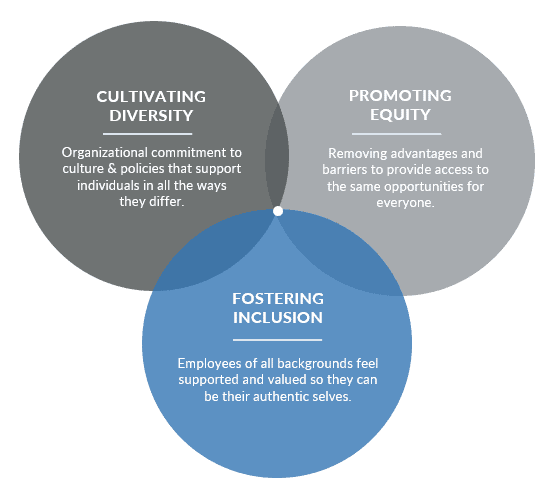
Diversity, equity and inclusion (DEI) is not a new concept in the field of human resources, but the topic received a huge spotlight during both the Me Too and Black Lives Matter movements. Creating an inclusive environment is critical to a company’s success, as proven through multiple studies over the years. Employers and graduate schools are now including it as part of their application process ranging from writing a statement highlighting a candidate’s experience working with those different from themselves or answering questions in a live interview.
The Diversity, Equity and Inclusion competency for career readiness includes the ability to understand and appreciate the importance of diverse perspectives and demonstrate consideration for individual, community and organizational viewpoints.
A new college graduate should be able to:
- Encourage expression of and celebrate differences
- Perceive, respect, and engage with differing viewpoints
- Recognize and address potential personal biases
- Accept feedback and willing to make necessary change
On the flipside, students may be seeking programs and jobs that value these qualities and integrate them into their work culture. Minority students want to hear from the employer directly as to what their future might look like at the company like any other candidate, but even more importantly, they’ll want to identify if a diversity program is really just a short term public relations initiative to brand their product.
You’ll want to look for these kinds of qualities in an employer:
- Has made commitments to foster a safe and healthy work environment;
- Is taking actionable steps to improve representation across all levels and titles;
- Holds leaders, managers, and employees accountable for actions and behaviors; and
- Has sought to center equity through all aspects of the employee process—recruitment, training and development, promotions, pay, benefits, and more.
This kind of authenticity and transparency can be a challenge to pull out in an interview, but here are some thoughtful questions applicants can ask gain a sense of how DEI is a priority in their organization:
- How does your organization define diversity? What lenses of diversity has your organization made a direct commitment toward?
- Does your organization have a chief diversity officer (CDO) or a designated leader to drive DEI and engage internal and external stakeholders?
- What social causes does your organization support?
- Does your organization actively support diverse suppliers, contractors, and small businesses?
- Has your organization made any formal commitments in support of racial equity?
- How does your organization center diversity, equity, inclusion, and belonging?
- Does your organization offer any formal employee training around biases, anti-racism, or general DEI?
- How has your organization prioritized executive accountability toward DEI advancement?
- Does your organization have any affinity groups or committees to support diverse populations? If so, how do these groups contribute to the culture of the organization?
- Does your organization complete annual compensation equity analysis?
- What resources has your organization provided to its employees in support of COVID-19 and racial injustices?
In an interview scenario, a diversity, equity and inclusion interview question might sound like this:
Tell me about a time you worked on a project with someone who was different from you?
When I was taking a STEM class as a Freshman, I was still pretty unsure about my math skills and was planning on majoring in English. A huge part of our grade was a team project that required heavy math and analytical skills, and quite frankly, I was nervous about how I was going to pull my weight with this project. The professor put us into teams of two, and my partner was someone I had never really interacted with outside of class. I always felt he was a bit… awkward.
We had a bumpy evening working on the project where it seemed like we weren’t on the same page at all, and it seemed like he didn’t understand my frustration. I opened up about my lack of math skills. He explained he loves math but he also has Asperger’s Syndrome and really didn’t like doing class presentations. He always had a hard time reading the room and understanding everyone’s reactions. Once we learned each others strengths and weaknesses, we were able to complete the project with all the math and presentation that was required. He’s one of my best friends now, and I’ve learned so much from him.
Competencies Highlighted: Diversity, Equity and Inclusion, Self-Awareness, Communication